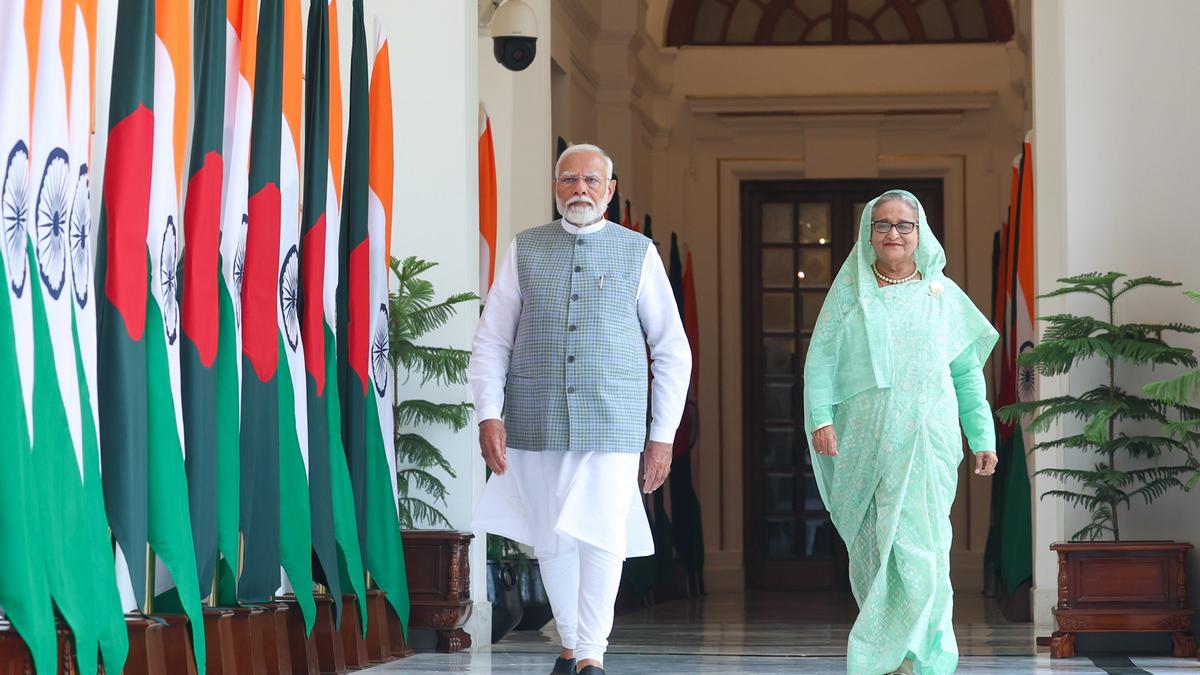By Md. Kamruzzaman
Since the collapse of the 15-year-long authoritarian regime of Sheikh Hasina on August 5, 2024, as a result of a mass upsurge, the bilateral ties between India and Bangladesh are seemingly going through an unfriendly manner.

Hasina, the daughter of Bangladesh’s founding leader, Sheikh Mujibur Rahman, was in power from 2009 to 2024 and ruled the country in an autocratic style in the name of democracy. The three national elections held under her administration in 2014, 2018, and 2024 were marred by gross irregularities including intimidation, fake voting, and ballot stuffing on the previous night. And it was India who supported Hasina to continue her regime through all those farcical elections that were boycotted by the opposition political parties and earned huge criticism worldwide. After each of the above controversial elections, India hastily recognized the victory of Hasina, prompting the global stance in favor of the Awami League regime.
People were so shocked due to such a violation of their voting rights, one of their fundamental and constitutional rights. Under the authoritarian regime of Hasina, people were not able to raise their voices against the abuse of power. Even people had to face arbitrary detention and torture in police custody for minimal criticism against the government on social media while mainstream media was seemingly under the full control of the Hasina administration.
Extrajudicial killings, enforced disappearances, random detention, and inhuman torturing under police custody squeezed the role of the opposition political parties including the main opposition Bangladesh Nationalist Party (BNP), and the country was actually turned into a one-party state run by an extremely authoritarian ruler.
According to different human rights organizations and available media reports, nearly 700 people were the victims of enforced disappearances in Bangladesh during the regime of Hasina. Local rights body, Ain O Salish Kendra or Law and Arbitration Center, in a report, also recorded that at least 1926 people were the victims of extrajudicial killings during the Hasina regime.
Price hikes of daily commodities made life awfully difficult while due to uncontrolled money laundering and looting in the banking sector, the overall economy fell into a fragile condition. The foreign reserve funds declined to an alarming course, resulting in an adverse impact on the export and import sectors.
According to a white paper published on December 1 this year, on an average $16 billion was illicitly siphoned off from Bangladesh every year during Sheikh Hasina’s rule. The white paper was submitted by a committee formed by the interim government of Bangladesh running under Nobel Peace Laureate, Professor Doctor Muhammad Yunus.
Debapriya Bhattacharya, an economist and the distinguished fellow of the Dhaka-based think tank Centre for Policy Dialogue (CPD) submitted the report to the Chief Advisor of the interim government Muhammad Yunus.
Amid such a critical situation in the country, some students of Bangladesh started a minor movement in demand of reform in government jobs in early July this year. As per the existing system till then 56 percent of government jobs were under various quotas and there were huge reports of misuse and corruption in the name of the quota system.
The powerful Prime Minister Sheikh Hasina undermined the movement by insulting the students as the children and grandchildren of Razakars. Razakars were the collaborators of the Pakistani soldiers during the historic 1971 Liberation War of Bangladesh.
Trusted shelter in danger
The students stormed out on the streets in protests after such an insult and the already aggrieved general people spontaneously joined the movement and eventually, a minor student movement turned into a mass uprising. In the wake of such an unprecedented mass revolution, Hasina was forced to flee to India as her trusted place for shelter. After the assassination of her father and other family members on August 15, 1975, Hasina also took refuge in India.
During the July-August Movement, Hasina applied the state forces including the police, the elite police force of Rapid Action Battalion or RAB, and Border Guard Bangladesh or BGB on a massive scale to neutralize the mass protests. According to a government report, more than 1,000 people, mostly students and youths were brutally murdered while above 20,000 were injured during the movement. Hundreds of injured have lost their eyesight and other organs and are paralyzed now.
Due to such a massacre, more than 100 murder cases have already been filed against Hasina. Bangladeshi people are eagerly waiting to see justice against all sorts of human rights violations during the Hasina regime including massacres during the July-August mass movement. The people of Bangladesh are very fed up against India for sheltering Hasina who is accused of genocide.
The anti-Indian sentiment is rapidly mounting here. During the one and a half decades of Hasina’s regime, India blindly supported her and enjoyed all sorts of benefits from the Awami League government under Hasina whom the Bangladeshi people consider as the puppet of India. Even Hasina openly said that India will never forget what Bangladesh has given during her tenure.
Hasina administration did not raise its voice during the killings of unarmed Bangladeshi citizens by the Indian Border Security Force or BSF and against any hegemonic role of India like monopoly controlling of the water of all 54 common rivers and transit and transshipment facilities in Bangladesh with a very poor service charge, controlling over the main seaport in Chattogram and imbalanced trade.
According to rights watchdog, Ain O Salish Kendra (ASK), at least 594 Bangladeshi citizens were killed by Indian BSF across the border from 2009 to 2023 with Hasina as the Indian-blessed Prime Minister in Bangladesh. But during Hasina’s regime which is also the highest record of uninterrupted ruling by any political party, Bangladesh failed to raise the issue before India as well as at different global platforms.
Though both India and Bangladesh claimed many times during Hasina’s term that both were friendly nations and the bilateral ties reached a record high, people’s perception was that Hasina was completely subservient to India’s hegemony.
Strategy for true friendship
Now, it has been proved that India owns Hasina and Awami League instead of the people of Bangladesh after sheltering her and letting her do politics while staying there. To establish a real friendship with Bangladesh India must avoid this strategy and recognize Bangladesh as an independent country and close neighbor.
After the change in regime in Bangladesh through huge bloodshed that the people have marked as a second independence, Bangladeshi people are not at all ready to see the big-brother-like attitude by India. Now Hasina is continuously trying to destabilize the interim government of Bangladesh staying in India before the very nose of the Indian administration. Her aggressive voice and phone calls have been leaked several times in the last four months, raising tensions in Bangladesh.
So, it is very clear that India-Bangladesh relations cannot be improved unless India shuns patronizing Hasina and Awami League and acts for people-to-people connectivity. The long-established narrative in Bangladesh that the one and only ally of India in Bangladesh is Sheikh Hasina and her political party Awami League must be changed by India through its new role with the new government free of Hasina and authoritarianism.
Interested in working with the interim government
Indian Foreign Secretary, Vikram Misri, visited Bangladesh on December 9 this year in a one-day hasty tour and it was also the highest diplomatic level tour in Bangladesh from India after the fall of Hasina. There was an almost two-hour-long inclusive meeting between Misri and his Bangladeshi counterpart, Md Jashim Uddin. The Indian diplomat also met Bangladesh’s Foreign Advisor Md. Touhid Hossain.
Later, Misri briefed journalists, claiming that India is interested in working closely with the interim government of Bangladesh led by Yunus. He also said India wants to boost people-to-people connectivity between the two South Asian neighbors. He, however, reiterated Indian concerns over the safety and security of minority Hindus in Bangladesh though his Bangladeshi counterpart in a separate press briefing urged India not to interfere in Bangladesh’s internal affairs.
It is very clear that to normalize the relationship with Bangladesh and decline the anti-Indian sentiment from the hearts of Bangladeshi people, New Delhi must hand over Hasina to Bangladesh or any third country for justice against human rights violations under Hasina government, especially during the July-August Movement. At the same time, India must avoid the prevailing hegemonic policy against Bangladesh as the people of Bangladesh, who have a glorious history of bloody war to gain independence, are not at all ready to accept any external snooping.

The writer, Md. Kamruzzaman, is a Bangladesh-based senior journalist and news analyst who mostly works at the Turkish TRT World. His freelance visual and textual works are also available with the Turkish Anadolu Agency, Indian NDTV and Chinese CGTN. He is a prize-winning journalist who mostly covers diplomacy, climate change impacts, human rights, economy, and politics. (mkzbablu@gmail.com).
